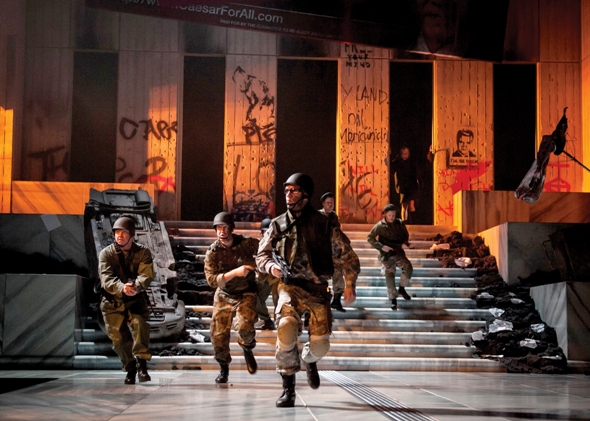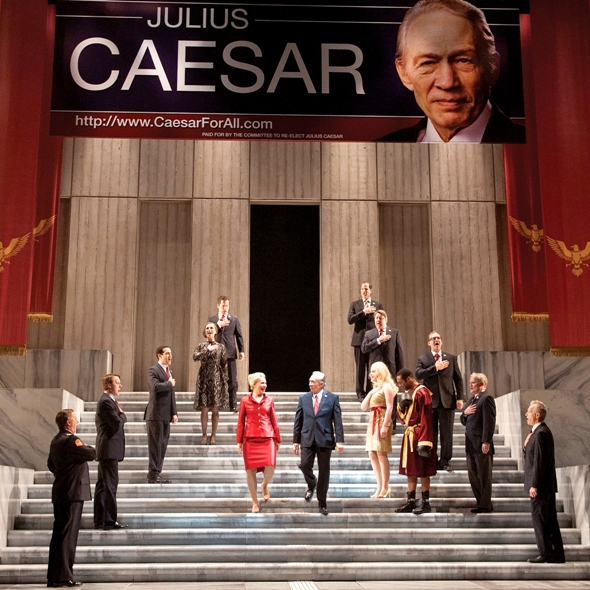Chicago Shakespeare Theater texts ‘Caesar,’ modernized and picture-perfectly true to Bard
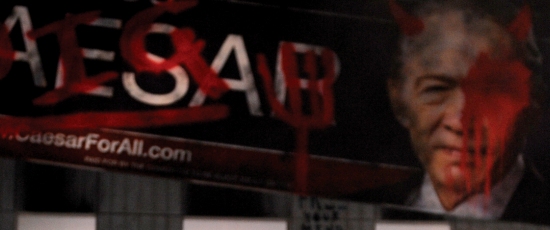 Review: “Julius Caesar” by William Shakespeare, at Chicago Shakespeare Theater through March 24 ★★★★
Review: “Julius Caesar” by William Shakespeare, at Chicago Shakespeare Theater through March 24 ★★★★
By Lawrence B. Johnson
Updating Shakespeare often betrays a tragic flaw: the substitution of novelty, or shock value, for the thing itself. All too often the language that bears the drama is subverted by empty trappings of currency. Then along comes the exception, the rare radical concept that devoutly serves the play, and you have something as bold, provocative and yet luminous as director Jonathan Munby’s modernized “Julius Caesar” at Chicago Shakespeare Theater.
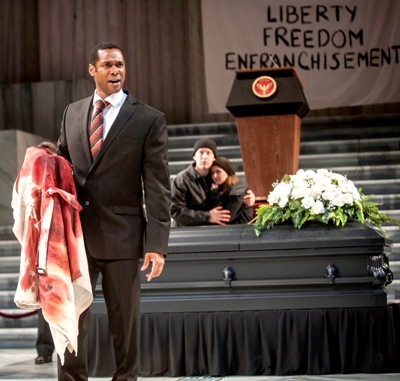 Friends, Romans, countrymen, lend me a Smartphone. And what would a contemporary Roman do with an iPhone at a political rally? Exactly, take pictures and show them around — a graphic record of unfolding folly, something we didn’t witness but only hear about, as a too-eager constituency urges a crown on its conquering hero, this great and calculating Caesar who has coyly demurred not once but three times.
Friends, Romans, countrymen, lend me a Smartphone. And what would a contemporary Roman do with an iPhone at a political rally? Exactly, take pictures and show them around — a graphic record of unfolding folly, something we didn’t witness but only hear about, as a too-eager constituency urges a crown on its conquering hero, this great and calculating Caesar who has coyly demurred not once but three times.
The phone bit is funny. But even funnier is Larry Yando’s wry account, as the cynical Casca, of Caesar’s sequence of refusals, each a touch less definitive than the one before. It is Shakespeare’s words sharpened by Yando’s satiric delivery that gives the scene its edge and bite. The phone is mere ornamentation.
On the other hand, when civil war breaks out in the wake of Caesar’s assassination, the use of loudly popping automatic weapons feels anything but ornamental. We find ourselves uneasy observers almost too close to the heat and smoke of battle. This is no costume drama but a bloody, ear-piercing struggle between two forces, each bent on the decimation of the other.
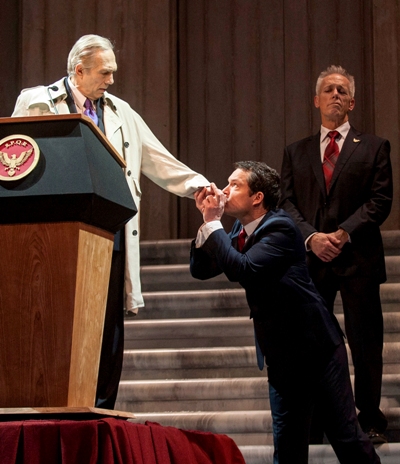 And in that, too, Munby’s “Julius Caesar” rises above the ordinary: The play’s second half, which can so easily lose steam and begin to feel bogged down in speechifying, never relinquishes the tension that first sweeps us headlong through the killing of Caesar to Marc Antony’s brilliantly measured funeral speech, in which he turns the populace against Brutus and his co-conspirators. Amid swift, desperate battle preparations and fierce clashes, the private musings and internal conflicts of the opposing leaders bear an unflagging aura of necessity and compulsion.
And in that, too, Munby’s “Julius Caesar” rises above the ordinary: The play’s second half, which can so easily lose steam and begin to feel bogged down in speechifying, never relinquishes the tension that first sweeps us headlong through the killing of Caesar to Marc Antony’s brilliantly measured funeral speech, in which he turns the populace against Brutus and his co-conspirators. Amid swift, desperate battle preparations and fierce clashes, the private musings and internal conflicts of the opposing leaders bear an unflagging aura of necessity and compulsion.
Three resonant performances spearhead a production that puts a high premium on language. John Light’s Brutus is a natural leader whose authority comes from a firm, calm rationality. His agony is palpable as he wrestles with his conscience over the moral question of Caesar’s assassination. As Cassius, who nudges Brutus into joining the conspirators, Jason Kolotouros provides a defining moment in his contemptuous dismissal of Caesar as a poor excuse for a Roman who yet would presume to be king.
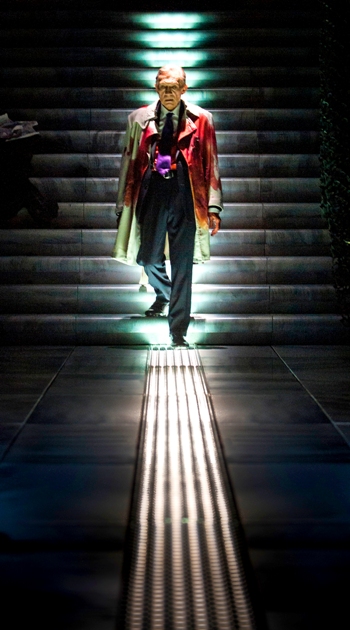 And Dion Johnstone’s Marc Antony carries the full weight of affection for the fallen Caesar turned to raging vengefulness. Johnstone delivers Marc Antony’s pivotal funeral oration with sure, controlled purpose, a steady drumbeat rising from quiet assurance that he has come “to bury Caesar, not to praise him” through a rhetorical crescendo inciting the throng to murderous retribution for the death of their devoted leader.
And Dion Johnstone’s Marc Antony carries the full weight of affection for the fallen Caesar turned to raging vengefulness. Johnstone delivers Marc Antony’s pivotal funeral oration with sure, controlled purpose, a steady drumbeat rising from quiet assurance that he has come “to bury Caesar, not to praise him” through a rhetorical crescendo inciting the throng to murderous retribution for the death of their devoted leader.
Ironically, Shakespeare rendered the figure of Caesar himself as something closer to a supporting character, even uncomplicated in his self-aggrandizing fashion. Yet he must display a proud confidence, and David Darlow’s noble Roman surely does that. He dies well, too. Indeed, I don’t know when I’ve ever seen a character on stage appear so vital one moment only to be reduced to a pulverized lump of carcass the next. This Caesar isn’t merely killed by his knife-wielding foes, he is shredded.
Only two women figure prominently in “Julius Caesar,” and in opposite ways they serve similar functions: Brutus’ wife Portia puts the screws to his already tormented mind by insisting that he tell her what’s troubling him. Caesar’s wife Calphurnia warns him of her omen-laden dream, an augury against his going to the Senate on this day; and he’s ready to comply until the conspirators caution him that failing to show up could cost him the crown. Here, Barbara E. Robertson’s pleading Calphurnia is more satisfying than Brenda Barrie’s rather whiny Portia.
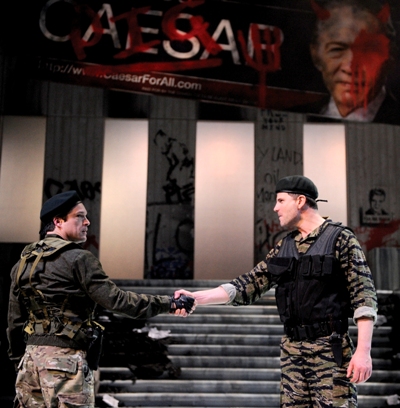 (Note: Munby has opted for the Shakespeare First Folio (1623) rendering of Caesar’s wife as Calphurnia, rather than the amended spelling – now discredited but still more commonly seen – Calpurnia that appears in the Second Folio (1632). The historical third wife of Julius Caesar was Calpurnia, but that apparently was not the Bard’s will.)
(Note: Munby has opted for the Shakespeare First Folio (1623) rendering of Caesar’s wife as Calphurnia, rather than the amended spelling – now discredited but still more commonly seen – Calpurnia that appears in the Second Folio (1632). The historical third wife of Julius Caesar was Calpurnia, but that apparently was not the Bard’s will.)
In this production, the Soothsayer – who warns Caesar to beware the Ides of March – also is a woman (McKinley Carter), whose recurrent appearances as a sort of wordless keening Greek chorus, hugely amplified, add an undeniable layer of grief and angst to the whole affair. She shows up perhaps once too often in a final emblematic gesture, apparently meant to hammer home the civil crisis for those who haven’t been paying attention.
Designer Alexander Dodge’s stark marble plaza set, which rises to a high platform at the rear, creates an impressive and adaptable arena for cheering and fighting as well as pondering. Kudos as well to costume designer Ilona Somogyi (love the suits!), lighting designer Philip S. Rosenberg and, not least, sound designer Lindsay Jones. The finishing touch, which removes any question of Munby’s time setting, is a vast banner across the proscenium that displays a larger-than-life image of Caesar with the underline: www.CaesarForAll.com.
O what a tumbled website he leaves.
Related Links:
- Performance location, dates and times: Details at TheatreinChicago.com
- Chicago Shakespeare Theater’s complete 2012-13 season preview: Details at ChicagoOntheAisle.com
Photo captions and credits: Righteous revolution goes awry in Chicago Shakespeare Theater’s “Julius Caesar” directed by Jonathan Munby. Descending: Dion Johnstone portrays Marc Antony, whose funeral oration incites Rome against Caesar’s murderers. Brutus (John Light) kisses the hand of Caesar (David Darlow) as Casca (Larry Yando) watches. The ghost of Caesar (David Darlow) haunts Brutus. Friends forever, vow Brutus (John Light, left) and Cassius (Jason Kolotouros). Below: Civil war throws Rome into turmoil. Julius Caesar (David Darlow) and Calphurnia (Barbara E. Robertson) greet the crowd. (Photos by Liz Lauren)
Tags: Alexander Dodge, Barbara E. Robertson, Brenda Barrie, Chicago Shakespeare Theater, David Darlow, Dion Johnstone, Ilona Somogyi, Jason Kolotouros, John Light, Jonathan Munby, Julius Caesar, Lindsay Jones, McKinley Carter, Philip S. Rosenberg

